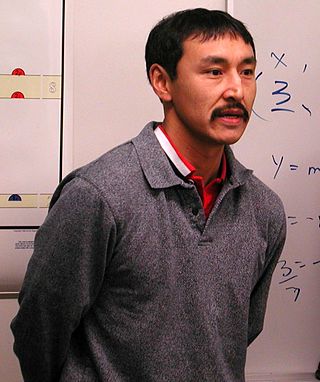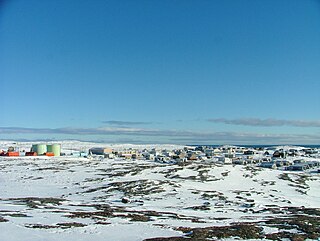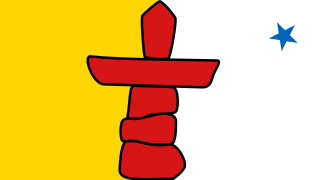
Iqaluit is the capital of the Canadian territory of Nunavut. It is the territory's largest community and its only city, and the northernmost city in Canada. It was known as Frobisher Bay from 1942 to 1987, after the large bay on the coast on which the city is situated. Its traditional Inuktitut name was restored in 1987.
National referendums are seldom used in Canada. The first two referendums in 1898 and 1942 saw a large number of voters in Quebec and in the remainder of Canada take dramatically-opposing stands, and the third in 1992 saw most of the voters take a stand opposed to that of the party in power.

Paul Okalik is a Canadian politician. He is the first Inuk to have been called to the Nunavut Bar. He was also the first premier of Nunavut.

Rankin Inlet is an Inuit hamlet on the Kudlulik Peninsula in Nunavut, Canada. It is the largest hamlet and second-largest settlement in Nunavut after the territorial capital, Iqaluit. Rankin Inlet is the regional centre for the Kivalliq Region.

Kitikmeot Region is an administrative region of Nunavut, Canada. It consists of the southern and eastern parts of Victoria Island with the adjacent part of the mainland as far as the Boothia Peninsula, together with King William Island and the southern portion of Prince of Wales Island. The regional centre is Cambridge Bay.

The history of Northwest Territories capital cities begins with the purchase of the Territories by Canada from the Hudson's Bay Company in 1869, and includes a varied and often difficult evolution. Northwest Territories is unique amongst the other provinces and territories of Canada in that it has had seven capital cities in its history. The territory has changed the seat of government for numerous reasons, including civil conflict, development of infrastructure, and a history of significant revisions to its territorial boundaries.

The Northwest Territories division plebiscite was a stand-alone, territory-wide plebiscite conducted on April 14, 1982. This was the first territory-wide plebiscite conducted in Northwest Territories history. The results of the plebiscite would eventually lead to the creation of Nunavut, and spawn three other plebiscites during the creation process of the new territory.

Hunter A. Tootoo is a Canadian politician who served as the Member of Parliament for Nunavut from 2015 to 2019. Elected as a Liberal to the House of Commons, he was appointed Minister of Fisheries, Oceans and the Canadian Coast Guard by Justin Trudeau on November 4, 2015. Tootoo resigned from that position on May 31, 2016, to take a leave from Parliament and completed a two-month treatment program for alcohol addiction. He sat as an independent member for the remainder of the 42nd Parliament and did not run for re-election in 2019.
Elections NWT is an independent, non-partisan public agency responsible for the administration of territorial general elections, by-elections, and plebiscites in accordance with the Elections and Plebiscites Act. Elections NWT is headed by the Chief Electoral Officer, an officer of the Legislative Assembly of the Northwest Territories.
Edward "Ed" Walter Picco is a Canadian politician first elected in the 1995 Northwest Territories election. He was re-elected in the 1999 Nunavut election and in the 2004 Nunavut election. Picco is one of the few Canadian politicians elected to two different legislative assemblies, having been elected in 1995 to the Legislative Assembly of the Northwest Territories and in 1999 to the Legislative Assembly of Nunavut.

Naujaat, Anglicised and officially known until 2 July 2015 as Repulse Bay, is an Inuit hamlet situated on the Arctic Circle. It is located on the shores of Hudson Bay, at the south end of the Melville Peninsula, in the Kivalliq Region of Nunavut, Canada.
Elections Nunavut is an independent agency that oversees elections and plebiscites in Nunavut, including:

Nunavut is the largest and northernmost territory of Canada. It was separated officially from the Northwest Territories on April 1, 1999, via the Nunavut Act and the Nunavut Land Claims Agreement Act, which provided this territory to the Inuit for self-government. The boundaries had been drawn in 1993. The creation of Nunavut resulted in the first major change to Canada's political map in half a century since the province of Newfoundland was admitted in 1949.
Titus Allooloo is a business man and former territorial level politician from Nunavut, Canada. He served as a member and cabinet Minister of the Northwest Territories Legislature through two terms from 1987 until 1995.
A plebiscite on the equal representation of men and women in the Nunavut Legislative Assembly was held on 26 May 1997 in the area of the Northwest Territories that was to be split off into the new territory of Nunavut. The proposal was rejected by 57.37% of voters, with a voter turnout of just 38.9%.

The 2013 Nunavut general election was held October 28, 2013, to elect 22 members to the 4th Legislative Assembly of Nunavut. In November 2012 the assembly passed the Nunavut Elections Act 2012, stating that the writs for election drop September 23, 2013, and an election be held October 28, 2013, the proclamation was registered November 9, 2012. At the 2013 forum, held on November 15, 2013, Peter Taptuna was selected as the new Premier of Nunavut.

The 2017 Nunavut general election was held on October 30, 2017 to return the members of the 5th Nunavut Legislature. The fifth general election held since the creation of the territory in 1999, it was the first election held under Nunavut's new fixed election dates law, which requires elections to be held no more than four years after the prior election.

Simonie Michael was a Canadian politician from the eastern Northwest Territories who was the first Inuk elected to a legislature in Canada. Before becoming involved in politics, Michael worked as a carpenter and business owner, and was one of very few translators between Inuktitut and English. He became a prominent member of the Inuit co-operative housing movement and a community activist in Iqaluit, and was appointed to a series of governing bodies, including the precursor to the Iqaluit City Council.











